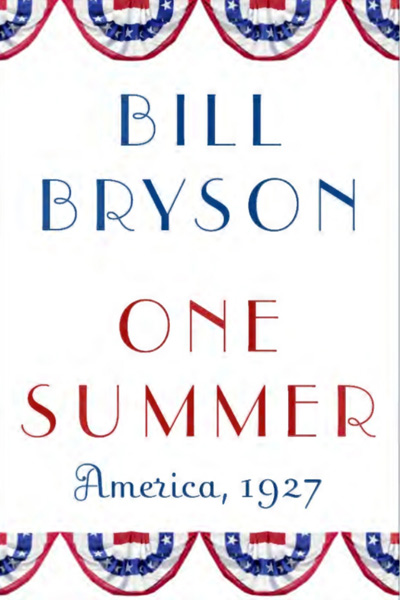4 More Years That Deserve the Bill Bryson One Summer Treatment
Reading Bill Bryson’s One Summer: America, 1927 is like having your favorite uncle read you bedtime stories—about bizarre homicides, persnickety aviators, people Calvin Coolidge hated, and the life and times of Babe Ruth.
One of 2013’s most enjoyable reads, One Summer presents a breezy yet exactingly thorough portrait of one eventful period in American history, flush with the sounds of roaring plane engines and a tut-tutting Herbert Hoover.
Perhaps in 50 or so years, Bryson—or his government-issued cyborg replacement—will write an engaging remembrance of 2013’s highs and lows, careening from Miley to health care to Syria to Batkid and back to Miley. Until that point, however, there are any number of possibilities for Bryson’s mighty pen. Here are a handful of epochs from the 20th century ripe for the One Summer treatment.
1912
It was a year of mankind pushing boundaries, blasting outward, upward, and onward, even featuring a race to the South Pole. The bold-print doomsday headline, of course, belonged to the sinking of Leonardo DiCaprio the misnomered “unsinkable” RMS Titanic. (The “Unsinkable” Molly Brown deserves a sizable chunk of pages on her own.) Mere days after 1,500 souls were lost in the North Atlantic, a monster was born: Fenway Park, to be exact (though its famous “Green Monster” was still decades away). Baseball is a star in One Summer, and so too is political tomfoolery. Good thing 1912 is chockablock with kooky politics! Taking a different track than the inestimable Doris Kearns Goodwin The Bully Pulpit, Bryson could embrace the Bull Moose Party and affectionately explore the “who’s,” “how’s,” and “ha’s” of Teddy Roosevelt’s epic rift with Taft. Plus, old-timey newspaper headlines!
1968
The ’60s are the decade that never really left us. Reams of paper and metric tons of hardback binding have been devoted to that turbulent decade. And with the 50th anniversary of President John F. Kennedy’s assassination looming, the focus has quadruple-downed on 1963 in particular. Nevertheless, Bryson’s light touch would be a welcome addition to the panoply of titles devoted to another momentous year in the 1960s: ’68. Whereas 1927 was marked by its soaring heights and aching lows, and 1912 by its man-versus-man/nature/reason attitude, 1968 can be identified by its churning, constant upheaval: an indigestion of the national conscience. The war in Vietnam was active (the Tet Offensive, the My Lai massacre), and both Martin Luther King, Jr., and Robert F. Kennedy were cut down. Europe provides even more material with the Prague Spring’s liberalizing attempts in then-Czechoslovakia and student-led unrest in France. Surely, the person whose job it is to write the book could dig up some brighter anecdotes to lighten the mood, too.
1977
The king is dead. Long live the king. Have mercy, 1977, which featured the lapsing of an old guard and new beginnings elsewhere. In June, Spaniards went to the polls in a general election for the first time since 1936, following the death of Francisco Franco. Two months later, on a bathroom floor in Memphis, Elvis Presley exited stage right. Pop culture giants Bing Crosby and Charlie Chaplin survived Elvis by a few months, but also wouldn’t see 1978. In the summer of ’77, women were becoming fully integrated in the Marines, and the first telephone traffic bounded down fiber-optic cables. The hunt for the Son of Sam ended in a capture in the year that saw the first execution in the United States since the Supreme Court had temporarily struck down capital punishment. The starts and stops, and beginnings and ends, should be enough to fill some pages, Bill, so get to writing.
1989
Two words: Dan Quayle. Could you ask for a better character? Though “potatoe”-gate and the Murphy Brown War were still ahead of him, the vice president was nothing but gold. But if that’s not compelling enough, elsewhere in 1989: Michael Jordan scored his 10,000th NBA point, the Berlin Wall fell (figuratively), the Exxon Valdez pumped hundreds of thousands of barrels of crude into the sea, and Tank Man made his stand in Tiananmen Square. Francis Fukuyama proclaimed it the “end of history,” just as a certain Barnes & Noble blogger was born. As you can see, it was a mixed bag. But boy, it was something to talk about—or write about, as the case may be.
What period in American history would you like to read a whole book on?
